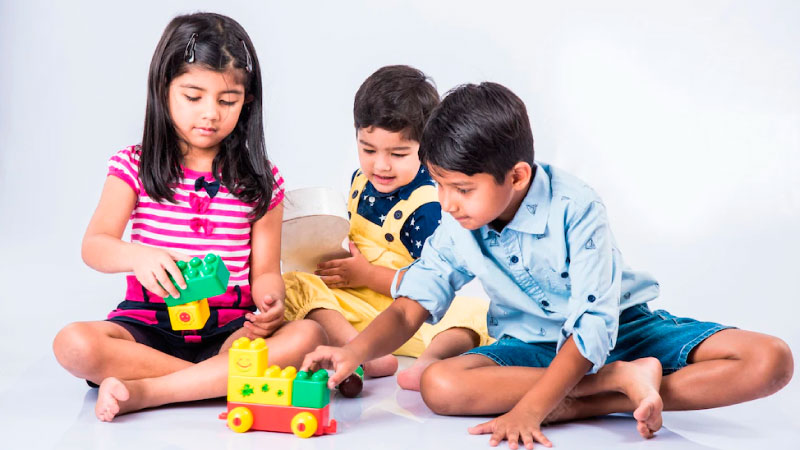Why do the best play schools in Bangalore use an activity-based learning curriculum for their students?
“Tots don’t dream, think, speak, or walk in a straight line; neither do creativity and imagination. Then why should education be conventional and linear?”
While book reading and classroom lectures are important, wouldn’t it be fun if children could act on their curiosity, experiment with different resources, and learn the practical applications of concepts in real life? That’s how activity-based learning or fun-based learning works.
An activity-based learning curriculum revolves around the concept of hands-on experimentation and the idea of fun. As opposed to the conventional methodology of passive listening to lectures, this gives students the opportunity to actively participate in a task. Educators engage students in cross-curricular individual or group projects, conduct experiments, and play interactive games. The idea is to promote the development of knowledge and skills through active participation and play.
Benefits Of Activity-based Learning
-
Develops The Habit Of Independent Learning
Fun-based learning shifts the perspective of education from teachers to students, allowing little ones to explore the concept themselves. Educators play the role of “mentor” or “growth facilitator” while students micromanage their learning. By being in the driver’s seat, learners are more likely to participate in the lesson.
-
Builds Socio-Emotional Intelligence
Stein et al. (2004) state in their book that collaborative classroom projects can help students with different backgrounds and learning levels bridge gaps among themselves. It enables them to overcome hesitation, brainstorm together and reach a consensus for task completion—skills that are required to work in a professional workspace. Peer-to-peer interactions also create the opportunity to understand, practise and imbibe major values, like respect, empathy, kindness, gratitude, etc., which are important for personal growth.
-
Expands Memory
Child development researchers suggest that students learn and memorise better from experiences that involve multiple senses, i.e., when they do things in the real world that could be related to what they’ve read or heard about. Activities like science experiments, brain teasers, riddles, puzzles, outings, role play, etc., are good for broadening the depth and breadth of learning. It also lets students explore and master different kinds of learning styles. E.g., visual, auditory, kinesthetic, etc.
-
Improves Competencies
From creative thinking and expression to critical thinking, problem-solving, decision-making, analysis, reasoning, flexibility, adaptability, etc., activity-based learning allows children to engage with multiple resources. It enables them to work things out by themselves, which aids in the development of multiple competencies and critical life skills.
-
Encourages Intrinsic Motivation
Fun activities constantly stimulate young minds and prompt children to respond in different ways. When children start enjoying their lessons, they’re intrinsically motivated to explore, experiment, ideate, innovate and express themselves.
The Critical Role Played By The Schools
While incorporating games and fun elements into the curriculum makes it more appealing, it makes the role of educators very important. Such an interactive curriculum requires skilled and passionate minds that could develop creative activities for each subject that probe students to dig deeper into the concepts. It’s equally important to strike a balance between formal learning and activities to ensure children are not just prepared for exams but also for life.
Looking for the best play school in Bangalore that makes learning enjoyable for your little ones? The Pre-CHAMPS programme at Chrysalis Kids includes fun-based performing arts activities like Rhythm-o-mania (music & rhyme), Happy Feet (dance & drama), yoga, martial arts, etc. They stimulate all the senses and encourage learners to learn from multiple experiences. Transition Block, AwStem Studio, Mind in the Making, etc., are other personalised interventions used by the best play school in Bangalore to make learning fruitful and worthwhile for all students, especially in the early years. Click to know more about their activity-based learning curriculum.
